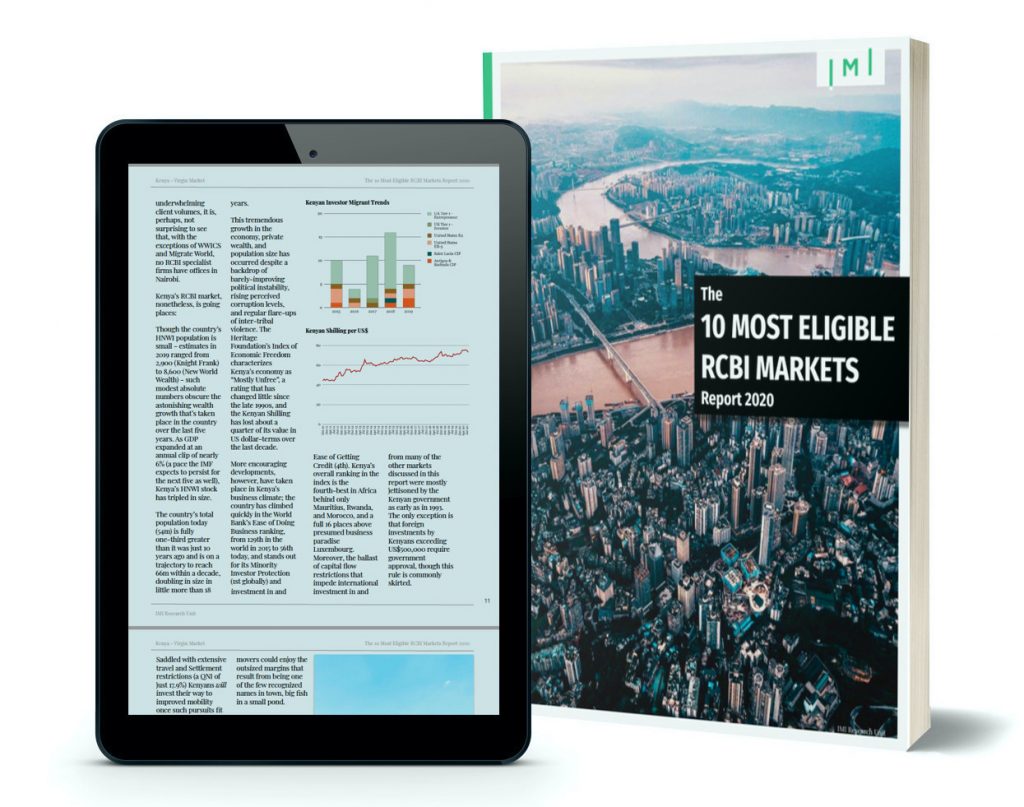Kenya: A Potential Gem of an RCBI Market – But Is It Too Early to Penetrate It?

Anatoliy’s Analysis
With Anatoliy Lyetayev
Anatoliy Lyetayev covers topics that help industry professionals be more efficient, do more business, and make more money.
Continuing my deep dive into fruitful investment migration markets, I remain in Africa for the time being; this time looking into the ripe Kenyan market. Much like its Nigerian counterpart, Kenya has long been touted as fertile ground for RCBI, yet remains relatively untapped. This, however, should change soon as the potential is too large to ignore.
The 7th largest African nation by population has a vibrant market, is welcoming of foreign business, and houses little RCBI competition, which makes me ask: why haven’t more RCBI firms targeted Kenya? To answer that, I will highlight the main characteristics of the Kenyan market and, by the end, leave it to you to decide whether it may be a good venture for your firm.
Lack of RCBI awareness
The main reason RCBI firms have not poured into Kenya is that the market is not yet as aware of the concept of investment migration as other, more mature ones buzzing with investment migration firms. An industry life cycle in any market usually goes through four stages:
- Introduction: The product is introduced into the market.
- Growth: The market becomes more aware of the product.
- Maturity: The market is aware. This is the optimal stage for doing business.
- Decline: Potential client pools begin to shrink or the product is no longer viable within the market.
While markets like Dubai, Hong Kong, Russia, and Mainland China can all be considered either in the growth or maturity phase, Kenya is still on the cusp of the introduction phase; with little to no understanding of RCBI and its benefits among the population.
The statistics provided to us by investment migration destination countries support this statement: In 2018, only 15 investment migration files by Kenyans were recorded – although the majority of programs do not share detailed nationality statistics, so that number is likely 3-4 times higher in reality – and in 2019 that number went down to just eight files. In both years, the recently suspended UK Tier 1 Entrepreneur Visa was the dominant program. The breakdown of the programs for both years combined was as follows:
- UK Tier 1 Entrepreneur Visa: 16 approved applications
- US EB5: 3 approved applications
- Saint Lucia CIP: 1 approved application
- Antigua & Barbuda CIP: 3 approved applications
Judging by the numbers above, terms such as citizenship by investment and, even more so, golden visas are alien to the average Kenyan investor.
This lack of awareness proves both an opportunity and a risk for pioneer market entrants. The opportunity lies in creating a strong brand and gaining a large market share free of competition in the early stages.
The risk, however, is that any new market entrant will have to increase awareness through expansive and aggressive marketing that will incur significant costs. Furthermore, any competitors that enter once the market awareness begins to grow can piggyback off the pioneering company’s efforts and have less work to do educating the masses on RCBI. It is a risky, yet potentially lucrative, venture being the early bird.
Betting on potential
The Kenyan market is one oozing with potential for RCBI but isn’t quite at the same level as established markets. Kenya’s population of 52.5 million is home to an estimated 2,942 high net worth individuals (HNWIs), 42 of whom are ultra-high net worth individuals (UNHWIs); having a net worth of 30 million USD or above. The ratio of HNWI to the population is not exactly mouthwatering, yet falls within the rates at which these elites are popping up in the African nation, as shown below:
- HNWI growth rate between 2015-2020: 14%
- UNWHI growth rate between 2015-2020: a whopping 163%
- The forecast HNWI growth rate in the upcoming 5 years: 16%
- The forecast UHNWI growth rate in the upcoming 5 years: 14%
The rates show that Kenya is on the path to creating large pools of potential RCBI clients. Hence, it becomes a betting game on whether to tap into the market remotely or go all in and become a household name. Timing will be crucial and can constitute the difference between making a fortune and making huge investments that pay off too late.
COVID highlights Kenyan’s need for RCBI
Kenyan nationals have needed RCBI for some time now, as their passport that provides visa-free entry into 61 countries worldwide – none of them in Europe or North America – is hardly a top-tier mobility document. It was the pandemic, however, that further highlighted the need for an enhanced global mobility tool along with a robust plan B.
Prior to the pandemic, the Kenyan passport provided visa-free access to 74 countries world-wide, again none in Europe or North America, and that number was reduced to 54 countries during the pandemic; a 27% decrease. The number has begun to steadily grow back but is still at 61, and the fact that the bulk of the visa-free destinations are in Africa does not remove that sense of entrapment that RCBI can remedy.
COVID also highlighted other aspects of Kenyan life that are a worry to its elite; as Kenya’s healthcare system languishes in the bottom third of the World Health Organization rankings, at 140 out of 191 countries overall. A dire situation when dealing with a global health crisis.
Kenya’s education and safety rankings are not much better, standing at 147 and 111 respectively. The African nation also ranks among the top 25 countries in the global terrorism index, just one spot lower than South Sudan. These factors have all forced Kenya to grapple with a lowly Human Development Index rating of 143; grim reading indeed.
These issues make it crystal clear for the Kenyan elite; if they want a better life for themselves and their families, they need RCBI. The problem is, they may not know about it.

This report is a detail-rich discussion on each of the world’s ten highest-ranked RCBI markets according to the findings of the Investment Migration Market Eligibility Index© (IMMEI).
The IMMEI and this accompanying report were created in response to investment migration executives’ repeated inquiries as to which RCBI markets globally show the most promise and which, consequently, should be the focus of their time, resources, and company expansion plans.
The 10 Most Eligible RCBI Markets
Report 2020
The report contains a wealth of data on each of the ten most eligible markets, and the essential information necessary for investment migration executives to make informed choices as to which markets to target, such as:
- RCBI participation statistics
- The number of approved applications for every major investment migration program from each market, for every year in the period 2015-19. Find out which types of programs (RBI vs. CBI vs. SUV) are the most popular among particular nationalities.
- HNWI population estimates and forecasts
- How many HNWI live in each market now, and by how much is the HNWI population expected to grow over the next five years.
- RCBI company competition analysis
- Which RCBI companies have offices in which markets? How many RCBI companies does each market have? Which RCBI companies are dominant in each market? The report contains a database of more than 100 RCBI-firm offices in the top 10 markets.
- Legal, regulatory, and political
- See which countries impose capital controls, restrictions on dual citizenship, or limits on foreign ownership. Compare the performance of each market’s currency over the last decade.
- Accessibility
- How cheap or expensive would it be to expand into a particular market? How hard is it to find qualified local personnel?Compare markets on cost of living, the price of Grade A office space, talent pools, and salary expectations.
- Long-term market potential
- Compare countries on how fast their economies and populations have grown in the last five years and at what pace they are forecast to grow over the next five.
IMI Club Pro Members:
FREE
IMI Club Members on annual billing plan (50% discount):
€249
IMI Club Members on monthly billing plan (25% discount):
€375
SPECIAL OFFER
1 year of IMI Club Membership +
the Report:
€299 (save 52%)
Non-Members:
€499
Christian Henrik Nesheim is the founder and editor of Investment Migration Insider, the #1 magazine – online or offline – for residency and citizenship by investment. He is an internationally recognized expert, speaker, documentary producer, and writer on the subject of investment migration, whose work is cited in the Economist, Bloomberg, Fortune, Forbes, Newsweek, and Business Insider. Norwegian by birth, Christian has spent the last 16 years in the United States, China, Spain, and Portugal.



